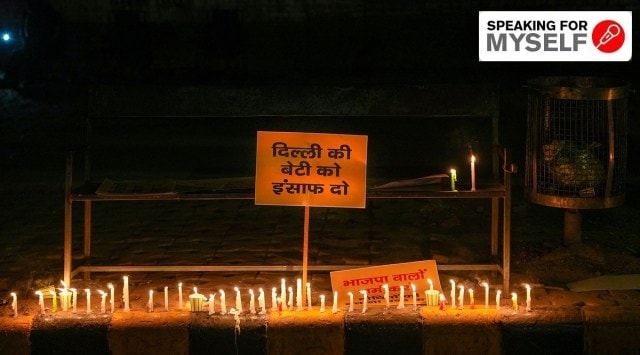
When I was about 13, my parents tasked me with signing for any packages or mail that came to our house. It was their way of teaching me responsibility. The bell rang, and I rushed. As I pulled the main gate open, my eyes pulled to the side where the delivery man stood, facing away from me. He turned to me, asking for a glass of water, and something caught my eye. His pants were pulled down. He was exposing himself to me. He did this every time he made a delivery, I was always at the receiving end — too scared of being relieved of my big responsibility if I were to “fess up” to his crime. I was a child, in my home, trying to sign for mail. That was not my first brush with sexual abuse, though.
Over the last few months, horror story after horror story of gruesome violence against women has rolled in, one after the other. Newspapers have reports of crimes against women all over their front pages — Shraddha Walkar, Anjali Singh, Ayushi Yadav, to name a few. Two women were run over on New Year’s Eve, two women were killed by people they assumed were family — all for making their own choices. Just how a woman transgressed and how far beyond the line is always the first thing we try to ascertain as such news reaches us. Whether to say “Look, she brought it on”, or to say, “Look, what could she have done to avoid this?” Working in a newsroom, these stories often stir up discussions about our own worst anxieties. In a similar conversation, when a colleague was fretting about having to leave work after sunset, in a bid to calm her worries, I said: “Listen, women don’t need to be out after sunset to meet a fate like this. I walk around all over Delhi and Noida, late into the night, and have survived each of my adventures, you’ll be fine.”
That conversation prompted this article. I do, by the way, go out late at night in Noida. Often alone or with other girlfriends. Very rarely does the fear in the back of my mind creep all the way to its fore anymore. That is not to say that I haven’t had any unpleasant experiences. But I feel immune to the threat that surrounds and paralyses many women — and rightly so. So immune do I feel that the idea that I should alter my behaviour to ensure my safety didn’t even cross my mind in any of these conversations. At my colleague’s insistence on wanting to understand how I can operate this way, I was forced to ponder. Think back to when this was a decision — not a way of being.
I was raised in two cities — Meerut and New Delhi. It is well established that UP and Delhi fare poorly when it comes to women’s safety. From a young age, I have been exposed to the violence that most women in the country are all too familiar with. I have also been exposed to the threat of potential violence and I was conditioned to be afraid: Tips and tricks to avoid being assaulted, avoid being exposed to unpleasant situations, and avoid an unfortunate fate.
Here’s the thing though: How is living in fear itself not an unfortunate fate? How was the constant threat of violence undercutting every moment of my life, not an unpleasant experience? Most importantly, how was the fear, in any way, protecting me from the possibility of assault? All my life, it seems, that I and other women I know have encountered what we’ve tried our best to protect ourselves from, in public and private spaces.
After a particularly challenging year in Meerut, when a classmate took pictures of me and tried to put them online, resulting in my tutor blaming me for bringing it upon myself, the decision was made. If violation was unavoidable, if the threat was going nowhere — well, neither was I. Being violated is trauma enough, inhibiting myself was just doubling it. I decided to live my life as if I weren’t unsafe.
At the end of the day, there is no “right” way to react to the reality that women in India live in. Being afraid is okay; perhaps, even logical. Being desensitised to our reality though also makes sense to me. Ultimately, the focus of the conversation needs to shift. Because how women react to their violation, or the threat of it, seems to matter very little when it comes to being safe. We need to address the violence. The question must not be: “What did she do?” It must be, “Why do we not care enough about women to stop failing them?”
sukhmani.malik@expressindia.com